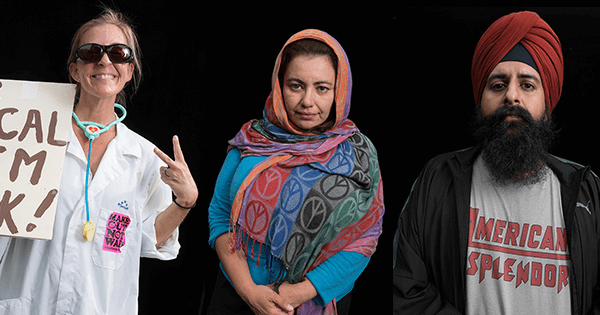
Barry Goldstein
For our last day covering the Republican gathering in Cleveland this week, Barry Goldstein—whose work we previewed in our Summer 2016 issue—sent us formal portraits of the protesters outside of the Quicken Loans Arena, who objected to Donald Trump’s nomination.
Complete RNC Series: Preview • Day One • Two • Three • Four
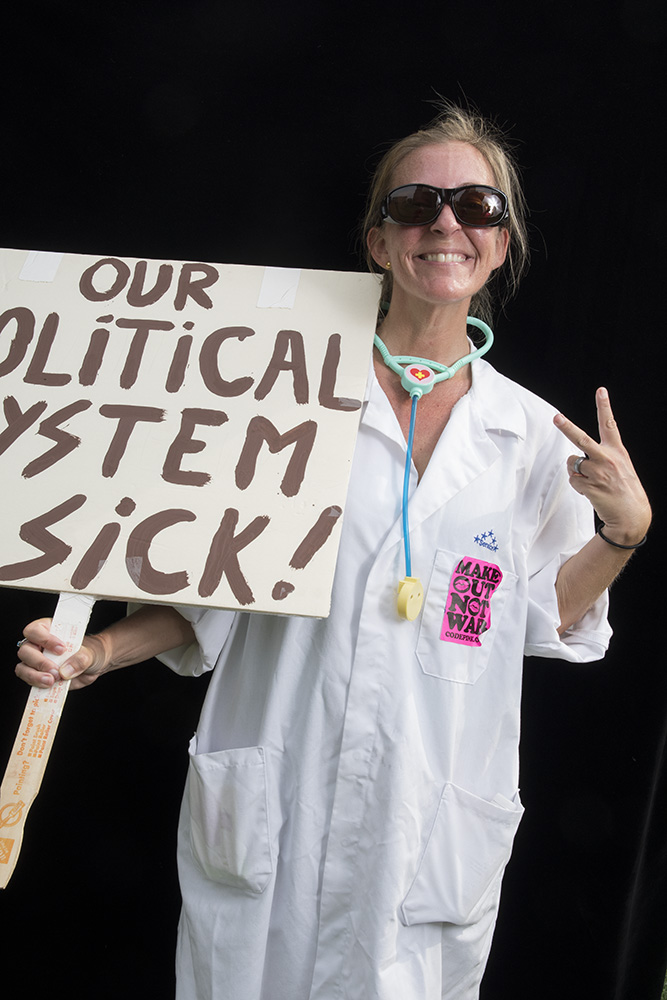 Ellie Mae Kaye: “I don’t think that Donald Trump should be the next president of the United States, and I cannot believe that the Republican Party has nominated him as a viable candidate. If people bothered to vote at the local level, perhaps we wouldn’t be in this situation.”
Ellie Mae Kaye: “I don’t think that Donald Trump should be the next president of the United States, and I cannot believe that the Republican Party has nominated him as a viable candidate. If people bothered to vote at the local level, perhaps we wouldn’t be in this situation.”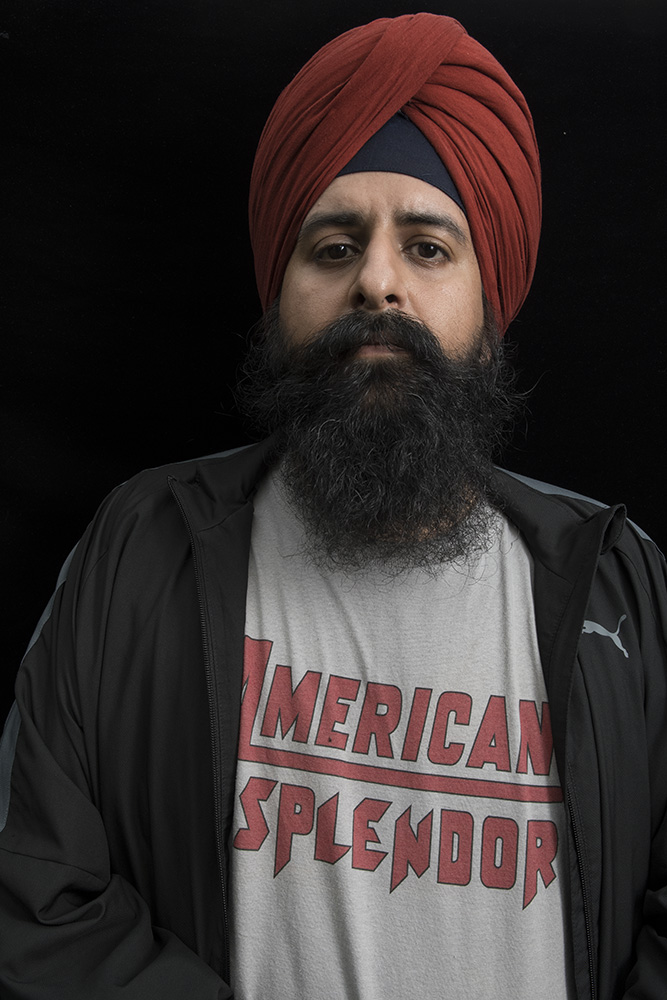 Aarish Singh: “Sometimes it can seem silly protesting—it can seem like a carnival. But it really matters this election. You have a man who’s made incredibly inaccurate, extremist statements. He’s someone who will allow white nationalists to campaign in his favor. He’s claiming extremist threats that are not real. We do have real threats like ISIS. But he stated that we had thousands of Muslims cheering on 9/11. It’s not only inaccurate, it’s tantamount to a hate crime. You have to take a stand against it.”
Aarish Singh: “Sometimes it can seem silly protesting—it can seem like a carnival. But it really matters this election. You have a man who’s made incredibly inaccurate, extremist statements. He’s someone who will allow white nationalists to campaign in his favor. He’s claiming extremist threats that are not real. We do have real threats like ISIS. But he stated that we had thousands of Muslims cheering on 9/11. It’s not only inaccurate, it’s tantamount to a hate crime. You have to take a stand against it.”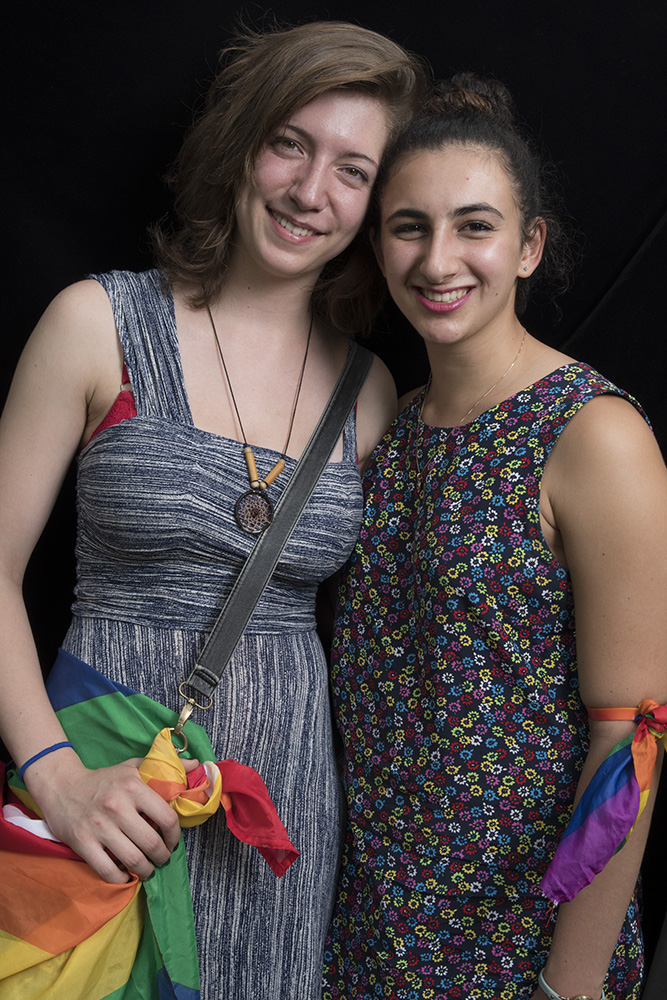 Amineh AlBashaireh (right): “Trump is spreading a lot of hatred, even more so than usual for the Republican Party. I’m a Cleveland native, and it’s not my type of scene. The Republican platform is taking itself backward, instead of forward. Why can’t we have an America that’s not racist? America can be great without Trump.”
Amineh AlBashaireh (right): “Trump is spreading a lot of hatred, even more so than usual for the Republican Party. I’m a Cleveland native, and it’s not my type of scene. The Republican platform is taking itself backward, instead of forward. Why can’t we have an America that’s not racist? America can be great without Trump.”
Arielle Welch (left): “Trump has been spreading a lot of hate against all kinds of people—Muslims, blacks, the LGBT community. I want to fight that. We’re members of the LGBT community. [The GOP’s support of] conversions therapy is unbelievably wrong. There’s nothing wrong with any of us. We don’t need to be converted.”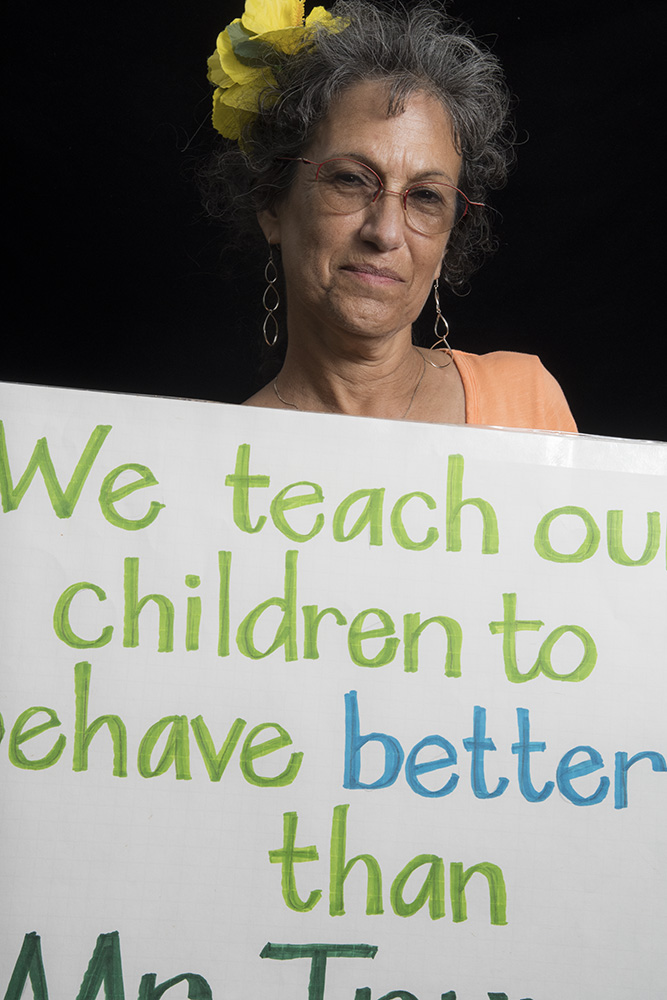 Dell Salza: “The Trump candidacy makes me extremely nervous. He’s just lowered the level of discourse so much. And I think he’s really inciting people to violence with his tone. It’s very worrying. We didn’t think he’d ever get this far—he would just be a joke, a clown. The fact that he’s gotten this far is really frightening. There are so many people who listen to what he’s saying, and I listen to what he’s saying, and we hear totally different things.”
Dell Salza: “The Trump candidacy makes me extremely nervous. He’s just lowered the level of discourse so much. And I think he’s really inciting people to violence with his tone. It’s very worrying. We didn’t think he’d ever get this far—he would just be a joke, a clown. The fact that he’s gotten this far is really frightening. There are so many people who listen to what he’s saying, and I listen to what he’s saying, and we hear totally different things.”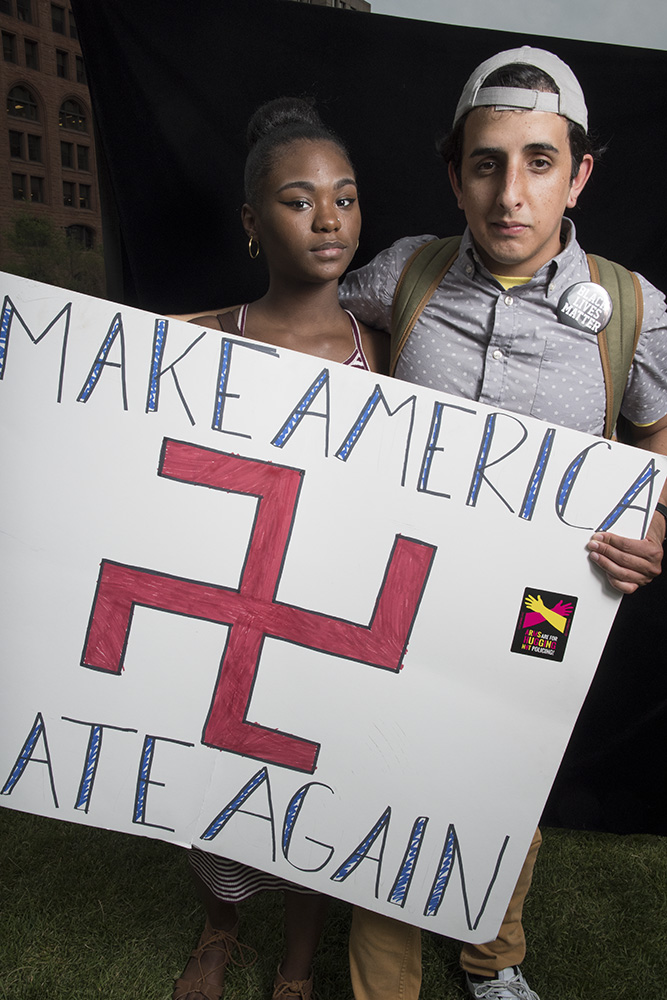 Jake Ellis (right): “My sign’s meant to draw parallels between the current neoconservative movement and the rhetoric in 1930s and the rise of Nazi Germany and Adolf Hitler. It’s meant to be a little provocative and a little disturbing. But I think, given what’s happening this political season, it’s appropriate. It fits the tone. I feel like Donald Trump is a personification of the degradation of American civil liberties.”
Jake Ellis (right): “My sign’s meant to draw parallels between the current neoconservative movement and the rhetoric in 1930s and the rise of Nazi Germany and Adolf Hitler. It’s meant to be a little provocative and a little disturbing. But I think, given what’s happening this political season, it’s appropriate. It fits the tone. I feel like Donald Trump is a personification of the degradation of American civil liberties.”
Deoja Capers (left): “I don’t like the sign. I don’t like the symbol. I think it’s hateful. But I support him, and I understand the message.”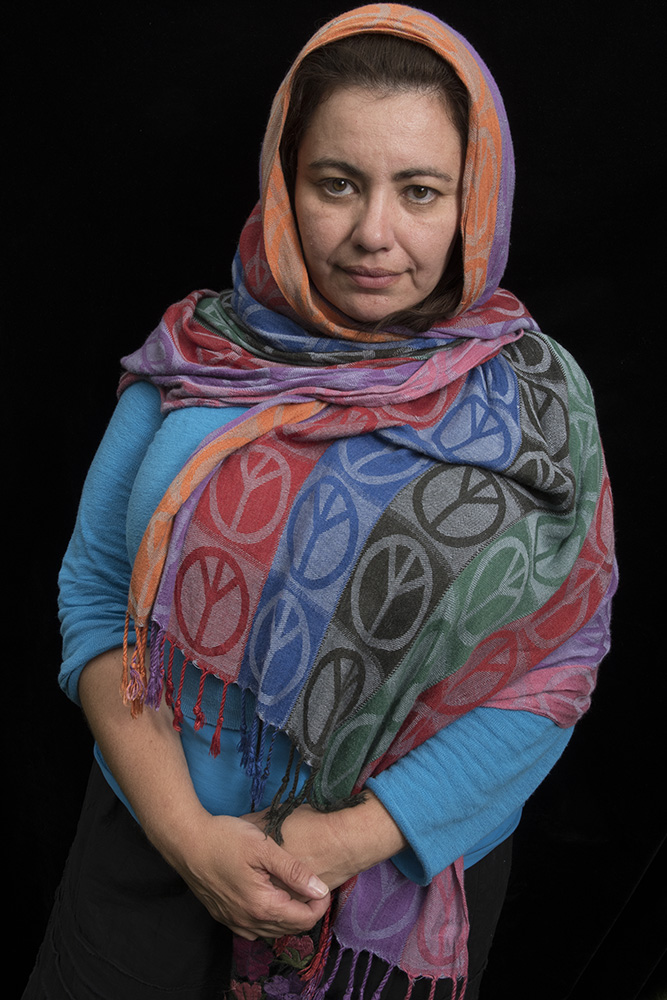 Sahar Alsahlani: “I’m here with the Council on American-Islamic Relations and the Fellowship of Reconciliation, to spread a message that a lot of people around the country of faith, or no faith, are trying to come together and combat the rhetoric that’s dividing the nation. I was here earlier with the group of ‘Nuns on a Bus’ that’s traveling around the country. I’m staying with an Episcopal dean of the trinity church and her partner. There’s just a great big coalition of people of faith that are coming together. We’re just here to tell everyone who we are, and that we do have the potential to mobilize our voters, to lobby, and to collectively effect change.”
Sahar Alsahlani: “I’m here with the Council on American-Islamic Relations and the Fellowship of Reconciliation, to spread a message that a lot of people around the country of faith, or no faith, are trying to come together and combat the rhetoric that’s dividing the nation. I was here earlier with the group of ‘Nuns on a Bus’ that’s traveling around the country. I’m staying with an Episcopal dean of the trinity church and her partner. There’s just a great big coalition of people of faith that are coming together. We’re just here to tell everyone who we are, and that we do have the potential to mobilize our voters, to lobby, and to collectively effect change.”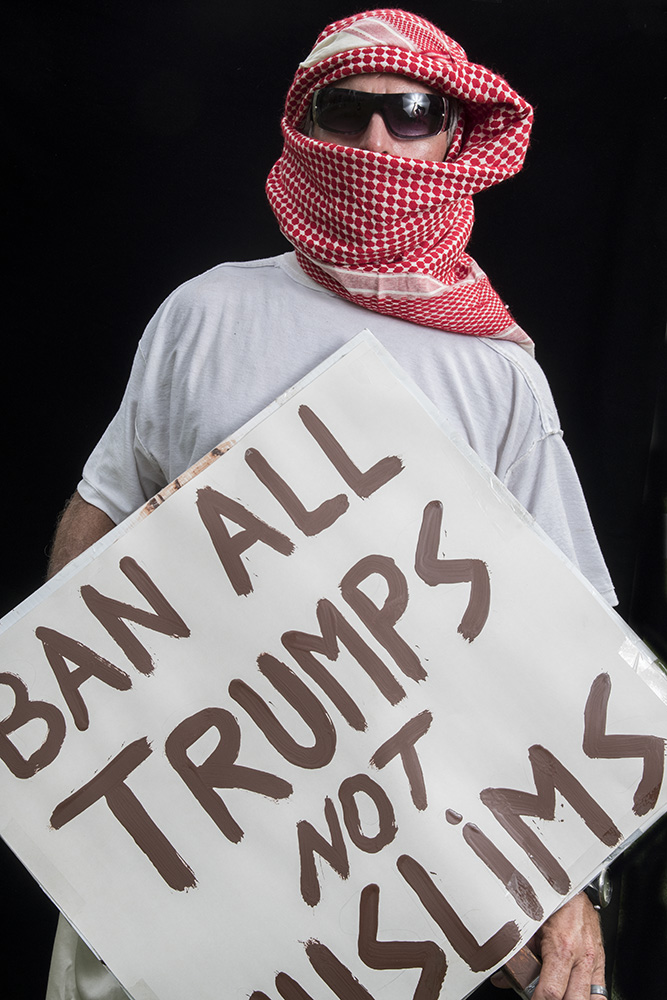 Terry Kaye: “Trump’s nomination is just preposterous, outrageous, unacceptable. And I don’t know what to do about it, but I came up with this. I’m dressed as a Muslim. Among many of his disparagements, he’s suggested we keep Muslims out, as well as refugees. I mean, that’s just ridiculous.
Terry Kaye: “Trump’s nomination is just preposterous, outrageous, unacceptable. And I don’t know what to do about it, but I came up with this. I’m dressed as a Muslim. Among many of his disparagements, he’s suggested we keep Muslims out, as well as refugees. I mean, that’s just ridiculous.
Permission required for reprinting, reproducing, or other uses.
Barry Goldstein is a photojournalist and the author of the monograph Gray Land: Soldiers on War, the result of three years of interviews with U.S. military personnel in Iraq and Afghanistan.

